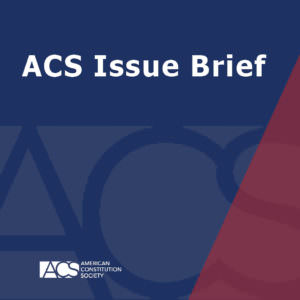From Error Toward Quality: A Federal Role in Support of Criminal Process
Former Head of the Statewide Public Defender Division of the Committee for Public Counsel Services in Massachusetts

ACS is pleased to distribute “From Error Toward Quality: A Federal Role in Support of Criminal Process,” an Issue Brief by James M. Doyle. Mr. Doyle is a lawyer in private practice with the Boston law firm of Carney & Bassil and the former head of the Public Defender Division of the Massachusetts Committee for Public Counsel Services, which is the statewide public defender agency.
Mr. Doyle begins his Issue Brief by observing that “[c]ontemporary medicine is experiencing a vibrant quality reform movement born in the aftermath of horrific reports of fatal medical errors.” Based on the reform experience in medicine, which is a team-oriented effort built on learning from routine human errors to improve practices and “prevent those inevitable errors from ripening into tragedies,” he sees an opportunity for the federal government to “catalyze the willingness of criminal justice practitioners and stakeholders to learn from their own mistakes . . . and lay the groundwork for a continuous quality improvement initiative in America’s criminal justice systems.” With the federal government’s help in designing a common template for assessing errors in the system, serving as a clearinghouse for collecting and sharing the analyses of errors performed at the local level, and providing other modest technical and financial support, Mr. Doyle believes that this effort could “set in motion a cultural shift that improves criminal justice, not by imposing top-down federal micro-management, but by exploiting the talents and insights of local systems’ frontline practitioners.” He also believes that it could “change a culture to one that routinely, every day, concentrates on improving the reliability of the criminal process for the victims, the accused, and the public.”
Mr. Doyle’s Issue Brief is the second in a series that ACS will be publishing focused on ideas about a possible role that the federal government can play in improving indigent defense systems in states around the country. Attorney General Eric Holder, Congress, and many other federal policymakers have taken notice of the crisis in indigent defense that has existed since 1963 when the U.S. Supreme Court held in Gideon v. Wainwright that each state has an obligation under the Sixth Amendment to the U.S. Constitution to provide a criminal defendant with an attorney when he or she cannot afford one, and they have specifically identified reform of the system as a priority. Mr. Doyle’s systemic approach to criminal justice reform, which he believes will help identify problems that undermine compliance with the Sixth Amendment, offers another recommendation as to what the U.S. Department of Justice, Congress, and other parts of the federal government do to help bring about reform.
Read the full Issue Brief here: From Error Toward Quality: A Federal Role in Support of Criminal Process
